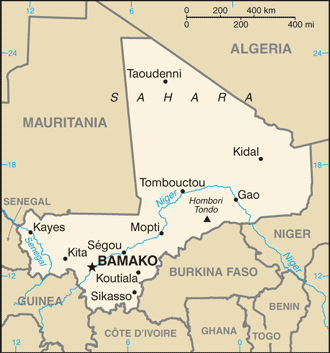The West African country of Mali is on high alert after a circulating vaccine-derived poliovirus type 2 (cVDPV2) was detected in a child in the capital city of Bamako, according to health officials. This is the first case in the country since June 2011.

Officials not that the case is a 19-month-old child from neighboring Guinea whose date of paralysis dates back to 20 July 2015.
The detected virus is genetically related to a cVDPV2 strain confirmed in the district of Siguiri, Kankan region in Guinea in August 2014 and for more than 2 years flows across international borders without detection.
Health officials say the risk of spread of this virus is considered high and indicates low immunization coverage in Ebola-torn Guinea. The health ministries of the two countries (Mali and Guinea), WHO and other partners are conducting investigations to determine the circumstances in which the virus appeared and circulated. At the same time, emergency operations for strong and appropriate response is being organized in both countries to halt virus circulation and to quickly end the epidemic.
“The Government of Guinea and its partners are informed and we began to evaluate all available resources to prepare for the campaign,” says Dr. Mamoudou Harouna Djingarey, assistant WHO Representative in Guinea.
The emergency operation must include at least three high-quality immunization campaigns to stop any possible spread to other communities. It is very important that people ensure that all children under five are immunized in the three passages campaign against polio. In Mali, the first campaign will begin this week and within 14 days in Guinea following the guidelines.
According to the Global Polio Eradication Initiative, Vaccine-derived polioviruses (VDPVs) are rare strains of poliovirus that have genetically mutated from the strain contained in the oral polio vaccine.
The oral polio vaccine contains a live, attenuated (weakened) vaccine-virus. When a child is vaccinated, the weakened vaccine-virus replicates in the intestine and enters into the bloodstream, triggering a protective immune response in the child. Like wild poliovirus, the child excretes the vaccine-virus for a period of six to eight weeks. Importantly, as it is excreted, some of the vaccine-virus may no longer be the same as the original vaccine-virus as it has genetically altered during replication. This is called a vaccine-derived poliovirus.
Robert Herriman is a microbiologist and the Editor-in-Chief of Outbreak News Today and the Executive Editor of The Global Dispatch
Follow @bactiman63
Related:


We are in the middle of a Mass Migration. What are we doing about vaccinations?